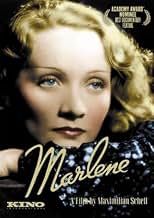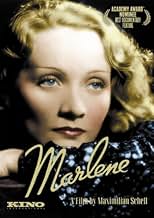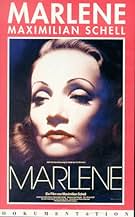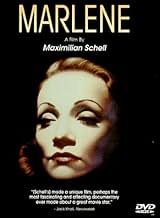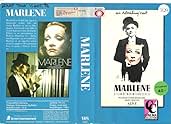Retrospective on the career of enigmatic screen diva Marlene Dietrich.Retrospective on the career of enigmatic screen diva Marlene Dietrich.Retrospective on the career of enigmatic screen diva Marlene Dietrich.
- Director
- Writers
- Stars
- Nominated for 1 Oscar
- 5 wins & 2 nominations total
- Director
- Writers
- All cast & crew
- Production, box office & more at IMDbPro
Featured reviews
A documentary retrospective on the career of enigmatic screen diva Marlene Dietrich.
I do not really know much about Marlene Dietrich. I have seen a few of her better known films, such as "Blue Angel", but know almost nothing about her personally. This documentary was good for fixing that, really allowing her to tell her story in her own words.
Apparently she did not want to be filmed, but agreed to be recorded. I actually think this makes for a better film. It allows for more footage to be shown, which is great when so many of her earlier works are hard to track down. Also, it serves little purpose to show her as an elderly woman... I mean, especially now that we saw how much better the screen time can be used.
I do not really know much about Marlene Dietrich. I have seen a few of her better known films, such as "Blue Angel", but know almost nothing about her personally. This documentary was good for fixing that, really allowing her to tell her story in her own words.
Apparently she did not want to be filmed, but agreed to be recorded. I actually think this makes for a better film. It allows for more footage to be shown, which is great when so many of her earlier works are hard to track down. Also, it serves little purpose to show her as an elderly woman... I mean, especially now that we saw how much better the screen time can be used.
Highlights of this brilliant documentary film must include Deitrich's opinions of directors she worked with. For example Orson Welles was a genius (`Cross yourself before you mention his name'!) She appeared in `Touch of Evil' without a fee when Welles couldn't raise finance. Von Sternberg always made things difficult for her so that she would use her brain and learn something whereas Fritz Lang was a `monster' who had her marks chalked on the floor when she arrived on set but his stride was much longer than hers. Then there's the controversy of Billy Wilder denying Marlene an Oscar opportunity for her superb performance in `Witness for the Prosecution'
`Marlene' includes generous extracts from many of her movies from the silent era in Germany to her final role in `Just a Gigolo' with many gems in between. Deitrich claims never to have watched her own films but director Schell runs excerpts on a video machine and gets her comments.
She also talks about her contribution to the Allied war effort, the desire of the German people for strong leadership and her contempt for Hitler.
Schell & Deitrich, who appeared together in ` Judgement at Nuremberg' often disagree sharply, and listening to Marlene hold her end up in the exchanges it's easy to forget that she was 82 years old when this documentary was made in 1983.
Summing up, `Marlene' is a must-see for anyone interested in older movies and her rendition of `See what the boys in the back-room will have' from `Destry Rides Again' alone is worth the money.
`Marlene' includes generous extracts from many of her movies from the silent era in Germany to her final role in `Just a Gigolo' with many gems in between. Deitrich claims never to have watched her own films but director Schell runs excerpts on a video machine and gets her comments.
She also talks about her contribution to the Allied war effort, the desire of the German people for strong leadership and her contempt for Hitler.
Schell & Deitrich, who appeared together in ` Judgement at Nuremberg' often disagree sharply, and listening to Marlene hold her end up in the exchanges it's easy to forget that she was 82 years old when this documentary was made in 1983.
Summing up, `Marlene' is a must-see for anyone interested in older movies and her rendition of `See what the boys in the back-room will have' from `Destry Rides Again' alone is worth the money.
I've seen another documentary on Marlene Dietrich and also read her daughter's book. I was interested in this one for a bizarre reason- I once sat on the New York subway next to someone who had the script of this documentary with him. Being a big fan of Maximilian Schell's, I wanted to see it.
Schell, who appeared with Dietrich in "Judgment at Nuremberg," was able to convince the actress to do this documentary, but she would not permit herself to be shown on camera.
She was last seen in the 1978 film Just a Gigolo, heavily made up and behind a veil, but still looking mighty good to me. But if one reads her daughter's book, it's easy to see that as she aged, she became a little eccentric. She spent the last 11 years of her life bedridden and allowed very few people to see her.
So the famous Dietrich voice supplies a narration of sorts to the glorious film clips, clips of her in newsreels, and film of her doing her one-woman show. It is all glorious, showing how she evolved over the years, her excellent acting in films like "Judgment at Nuremberg," "Witness for the Prosecution," and "Touch of Evil," and the incredible charisma and beauty she shared with the audience in her show.
At one point, Schell offends her and she lays into him. making a remark about him being a "Swiss", and telling him she'd sat at tables with politicians and dignitaries and no one had ever spoken to her like that. She went on for a while. Schell punctuates her words with images of flying film strips and a whizzing, distorted background.
She could be abrupt, but also emotional as she recites a favorite poem of her mother's.
Dietrich talks like she hated making movies, didn't do much to get into a role, her private life was private. It's hard to say now. One thing that wasn't gone into was her passion for Jean Gabin, nor was much of the documentary focused on her war work.
Marlene Dietrich was a magical personality, an exotic beauty, a wonderful actress, and a magnificent performer. This documentary gives us plenty of examples of her magic and, if you don't appreciate her now, you will after seeing this.
She was the kind of star we won't see again - androgynous, earthy, and very much of her time. In her eighties when this was made, her attitude is very much like her final words in Touch of Evil: "What does it matter what you say about people?"
Schell, who appeared with Dietrich in "Judgment at Nuremberg," was able to convince the actress to do this documentary, but she would not permit herself to be shown on camera.
She was last seen in the 1978 film Just a Gigolo, heavily made up and behind a veil, but still looking mighty good to me. But if one reads her daughter's book, it's easy to see that as she aged, she became a little eccentric. She spent the last 11 years of her life bedridden and allowed very few people to see her.
So the famous Dietrich voice supplies a narration of sorts to the glorious film clips, clips of her in newsreels, and film of her doing her one-woman show. It is all glorious, showing how she evolved over the years, her excellent acting in films like "Judgment at Nuremberg," "Witness for the Prosecution," and "Touch of Evil," and the incredible charisma and beauty she shared with the audience in her show.
At one point, Schell offends her and she lays into him. making a remark about him being a "Swiss", and telling him she'd sat at tables with politicians and dignitaries and no one had ever spoken to her like that. She went on for a while. Schell punctuates her words with images of flying film strips and a whizzing, distorted background.
She could be abrupt, but also emotional as she recites a favorite poem of her mother's.
Dietrich talks like she hated making movies, didn't do much to get into a role, her private life was private. It's hard to say now. One thing that wasn't gone into was her passion for Jean Gabin, nor was much of the documentary focused on her war work.
Marlene Dietrich was a magical personality, an exotic beauty, a wonderful actress, and a magnificent performer. This documentary gives us plenty of examples of her magic and, if you don't appreciate her now, you will after seeing this.
She was the kind of star we won't see again - androgynous, earthy, and very much of her time. In her eighties when this was made, her attitude is very much like her final words in Touch of Evil: "What does it matter what you say about people?"
On very few occasions did Marlene Dietrich drop the well-constructed mask of her eternal beauty. She was the daughter of a soldier, and very rarely showed (real) emotions. Max Shell was able to give us a glimpse of the woman behind the facade in this breathtaking documentary (even though Marlene did not allow their conversations to be filmed, a sound-recording is all we get from the 83 year old legend). It is certainly not a flattering portrait. Marlene is rude and impatient, and she tells all kinds of lies. But at the end of the documentary there are a few extremely touching moments: Her sudden joy when she sings songs from her ´Berliner Platte´ (the Berlin album), a film-clip from her last movie ´Just a gigolo´ (1978), and her emotional reaction to the favorite poem of her mother, read by the director. When Shell finally breaks her defence mechanism, we hear an old and tired woman, tired of being perfect for more than six decades. And every time it breaks my heart to think how hard it must have been to keep up the facade that was Marlene Dietrich.
Today I watched a documentary on Marlene Dietrich titled 'Marlene'. It was produced in 1984 and directed by Dietrich's "Judgment at Nuremberg" co-star Maximilian Schell. I don't know how many of you know this, but Marlene agreed to do the film only if the director was in compliance with her wish not to be photographed, and because of this she does not appear in the film. But her Paris apartment is recreated to give the illusion that the actress is really there. Her voice, however, is used as the narration through the film, which is aided with various clips of her movies, concert performances and newsreel footage.
To begin with, Marlene shows little interest in this whole film -- it's obvious -- and even less interest in the discussion of her movies -- that's, sadly, even more obvious. I'm convinced now more than ever that she never enjoyed working on a movie. Still, it's nice to discover that she is able to remember her experiences with a lot of clarity, sometimes using the German word "kitsch" (worthless) to describe most of her film work; although I may disagree with her on some. Marlene also talks about other things besides her films. Her singing career and personal life are briefly discussed, as well as Jean Gabin, Ernest Hemingway, Josef von Sternberg and her marriage to Rudolph Sieber.
It's a strange documentary that you can't help but like. And not everything you would like to hear (even if you consider them important in her life) is mentioned a whole lot in this; such as the war years, where Marlene's tireless efforts to entertain the allied troops stationed at the front, seemed neglected. I remember hearing Schell saying to Marlene in the beginning of the film that he didn't want this to be a typical A-B-C from childhood to present interview. Well, perhaps it would've worked better had it been that way. Much of it was a mess -- not difficult to follow necessarily -- just may have been easier on Marlene's temper had there been some kind of order to the whole thing. Maybe.
It gets a little heated towards the end of the film. Schell seems to have angered Marlene at one point by pressing her for a comment on one of her movies. I don't know how serious it was after the tape stopped rolling, but she evidently wasn't amused. In the end, it becomes apparent to the viewer how cranky Dietrich is at this point in her life. You could argue that it might have something to do with her age, but I think it has more to do with the fact that she was an incredibly disciplined woman who favored manners and intelligence over such common habits like idle gossip and unpreparedness. In fact, her attitude during this film is so overwhelming to the point where it's just sad. She may sound bitter, but she's a woman worth listening to regardless. Watching this documentary gives Riva's book even more credibility, in my opinion, especially in the final years of Dietrich's life where you wonder if all those incidents you read about were true.
To begin with, Marlene shows little interest in this whole film -- it's obvious -- and even less interest in the discussion of her movies -- that's, sadly, even more obvious. I'm convinced now more than ever that she never enjoyed working on a movie. Still, it's nice to discover that she is able to remember her experiences with a lot of clarity, sometimes using the German word "kitsch" (worthless) to describe most of her film work; although I may disagree with her on some. Marlene also talks about other things besides her films. Her singing career and personal life are briefly discussed, as well as Jean Gabin, Ernest Hemingway, Josef von Sternberg and her marriage to Rudolph Sieber.
It's a strange documentary that you can't help but like. And not everything you would like to hear (even if you consider them important in her life) is mentioned a whole lot in this; such as the war years, where Marlene's tireless efforts to entertain the allied troops stationed at the front, seemed neglected. I remember hearing Schell saying to Marlene in the beginning of the film that he didn't want this to be a typical A-B-C from childhood to present interview. Well, perhaps it would've worked better had it been that way. Much of it was a mess -- not difficult to follow necessarily -- just may have been easier on Marlene's temper had there been some kind of order to the whole thing. Maybe.
It gets a little heated towards the end of the film. Schell seems to have angered Marlene at one point by pressing her for a comment on one of her movies. I don't know how serious it was after the tape stopped rolling, but she evidently wasn't amused. In the end, it becomes apparent to the viewer how cranky Dietrich is at this point in her life. You could argue that it might have something to do with her age, but I think it has more to do with the fact that she was an incredibly disciplined woman who favored manners and intelligence over such common habits like idle gossip and unpreparedness. In fact, her attitude during this film is so overwhelming to the point where it's just sad. She may sound bitter, but she's a woman worth listening to regardless. Watching this documentary gives Riva's book even more credibility, in my opinion, especially in the final years of Dietrich's life where you wonder if all those incidents you read about were true.
Did you know
- TriviaDirector Maximilian Schell got Marlene Dietrich to agree to appear in this documentary only on the stipulation that she not be photographed as she looked at the time. Instead, we only hear her in interviews.
- GoofsThe documentary states that "Dietrich" was the maiden name of Marlene's mother. This is completely untrue. Wilhelmina Dietrich was born Wilhelmina Felsing. Dietrich was the name of Marlene's biological father, Louis Dietrich, after whose death Wilhelmina married Eduard von Losch, who thereby became Marlene's stepfather.
- Quotes
[Last line, to director Maximilian Shell about this film]
Marlene Dietrich: You never sell that in America.
Details
- Release date
- Country of origin
- Languages
- Also known as
- Marlene: An Astonishing Visit
- Production companies
- See more company credits at IMDbPro
Box office
- Gross US & Canada
- $852,676
- Opening weekend US & Canada
- $14,490
- Nov 9, 1986
- Gross worldwide
- $852,676
Contribute to this page
Suggest an edit or add missing content

